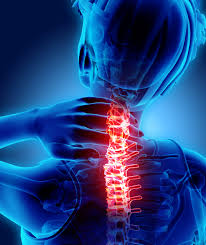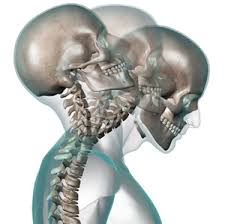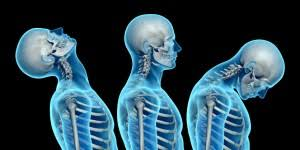 Whiplash is an injury to your neck, or “cervical spine.” It is often caused by Motor Vehicle Accidents (MVAs), particularly with rear-end accidents. Often the injury results from a sudden acceleration then deceleration, where the trunk is forced backwards, and then ramps up the back of the seat, causing the neck to hyperextend and then recoil forcefully forward. Whiplash can also be the result of a sports injury, particularly with contact sports, and may co-occur with a concussion.
Whiplash is an injury to your neck, or “cervical spine.” It is often caused by Motor Vehicle Accidents (MVAs), particularly with rear-end accidents. Often the injury results from a sudden acceleration then deceleration, where the trunk is forced backwards, and then ramps up the back of the seat, causing the neck to hyperextend and then recoil forcefully forward. Whiplash can also be the result of a sports injury, particularly with contact sports, and may co-occur with a concussion.
A whiplash injury may cause damage to soft tissue or muscles around the neck, the ligaments in your neck, the discs between the vertebrae of your neck, the joints in your neck and/or the nerves in your neck or arms. Whiplash is usually classified based on the severity of signs and symptoms, and whether there is any loss of neck movement, any neurological deficits (decreased sensation, muscle weakness), or the presence of a fracture.
 The most common symptoms of whiplash include neck pain, neck stiffness, shoulder pain, mid to lower back pain, pain in your arm or hand, numbness or tingling in your arm or hand, headache, ringing in your ears, and fatigue. You may also have pain that radiates into your jaw, face, or behind your eyes.
The most common symptoms of whiplash include neck pain, neck stiffness, shoulder pain, mid to lower back pain, pain in your arm or hand, numbness or tingling in your arm or hand, headache, ringing in your ears, and fatigue. You may also have pain that radiates into your jaw, face, or behind your eyes.
Physical therapy treatment can help following a whiplash injury to reduce pain, restore normal mobility in the neck and back, and help with the return to essential activities, daily functions, and recreational activities. Physical therapy treatment may involve hands on therapy to increase mobility of the neck and reduce pain, stretching exercises, strengthening of the neck, back and surrounding muscles, balance exercises and posture education!
Physiotherapy can also help to address and improve concussion related symptoms that may have occurred with the whiplash injury, including headaches, dizziness, fogginess, difficulty balancing or coordinating movements, nausea, trouble concentrating, and double or blurry vision.

